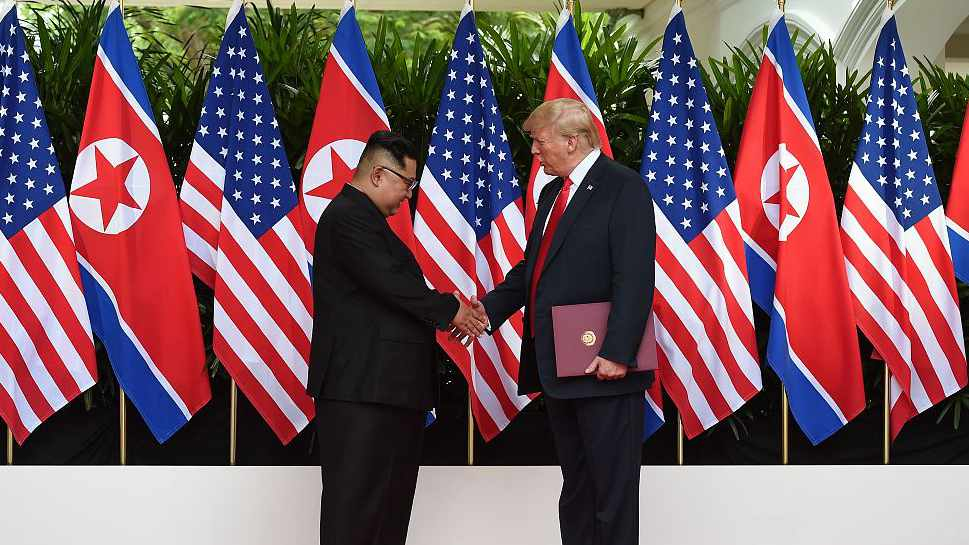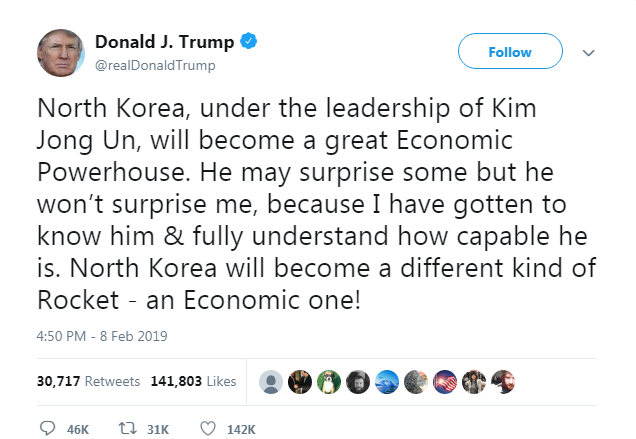
World
12:33, 13-Feb-2019
U.S. military commander: 'Optimistic about another Trump-Kim summit'
Updated
15:58, 13-Feb-2019
CGTN
00:38

Top U.S. military commanders reported a "palpable" decline in tension on the Korean Peninsula during a U.S. Senate Armed Services Committee hearing on Tuesday.
A top U.S. military commander expressed optimism prior to the second summit soon to be held in Vietnam between U.S. President Donald Trump and the Democratic People's Republic of Korea (DPRK) leader Kim Jong Un.
The second Trump-Kim summit is scheduled to be held February 27-28 in the Vietnamese capital of Hanoi, Trump announced Friday on his personal Twitter account, adding that he is "looking forward to seeing Chairman Kim & advancing the cause of peace!"
The commander expressed his confidence in both sides' willingness to seek more common ground through continuous negotiation, but also uttered uncertainty over whether the DPRK will completely abandon its nuclear weapons.

Republic of Korea Defense Minister Song Young-moo (R) talks with Philip Davidson, commander of U.S. Indo-Pacific Command, at the Defense Ministry in Seoul, June 25, 2018. /VCG Photo
Republic of Korea Defense Minister Song Young-moo (R) talks with Philip Davidson, commander of U.S. Indo-Pacific Command, at the Defense Ministry in Seoul, June 25, 2018. /VCG Photo
“We think it is unlikely that North Korea (DPRK) will give up all of its nuclear weapons or production capabilities, but seeks to negotiate partial denuclearization in exchange for U.S. and international concessions,” Yonhap News Agency reported quoting Admiral Philip Davidson, chief of the U.S. Indo-Pacific Command, said in a written statement to the Senate Armed Services Committee ahead of a hearing.
Davidson regarded the unprecedented first Trump-Kim summit last June as a "significant milestone." "And I am optimistic about another U.S.-North Korea (DPRK) summit," he added.
He mentioned some steps taken by the DPRK, including the dismantlement of tunnels at its nuclear testing site in Punggye-ri, while stressing that "much needs to be done to make meaningful progress."
“It has decreased the chance of mistakes, miscalculation, and it's continued to preserve space for the main effort, [for] the Department of State to continue along this road of negotiations and discussions with the DPRK,” General Robert Abrams, commander of U.S. Forces Korea, said.
The U.S. has demanded more concrete steps toward denuclearization, while the DPRK has sought sanctions relief and a formal end to the 1950-53 Korean War.
The two leaders have a history in exchanging explosive words but last year witnessed tensions easing on the Korean Peninsula as well as between Kim and Trump.
Kim pledged at the first summit to work toward the denuclearization of the Korean peninsula. In September, Kim expressed willingness to take steps, including the permanent dismantlement of nuclear facilities at his country's main nuclear site of Yongbyon, in return for corresponding U.S. moves.
What Trump called "productive meetings" have been made between the two countries to prepare for the coming summit, and he tweeted Friday not without a rosy tone that, "North Korea (DPRK), under the leadership of Kim Jong Un, will become a great Economic Powerhouse."

Twitter screenshot
Twitter screenshot
Stephen Biegun, U.S. special representative for the DPRK, held three days of talks in Pyongyang to prepare for the summit, the State Department said on Friday.
U.S. Secretary of State Mike Pompeo earlier in Slovakia said he hopes the two sides will make "substantial progress" in the coming weeks.
"The pillars that were agreed to back in Singapore in June, I hope we make progress along each one: security and peace on the peninsula, the denuclearization in the peninsula, as well as ensuring that we create the conditions for a brighter future for the North Korean (DPRK) people," he said.
(Cover: DPRK leader Kim Jong Un (L) shakes hands with U.S. President Donald Trump after taking part in a signing ceremony at the end of their historic U.S.-DPRK summit, at the Capella Hotel on Sentosa Island, Singapore, June 12, 2018. /VCG Photo)

SITEMAP
Copyright © 2018 CGTN. Beijing ICP prepared NO.16065310-3
Copyright © 2018 CGTN. Beijing ICP prepared NO.16065310-3